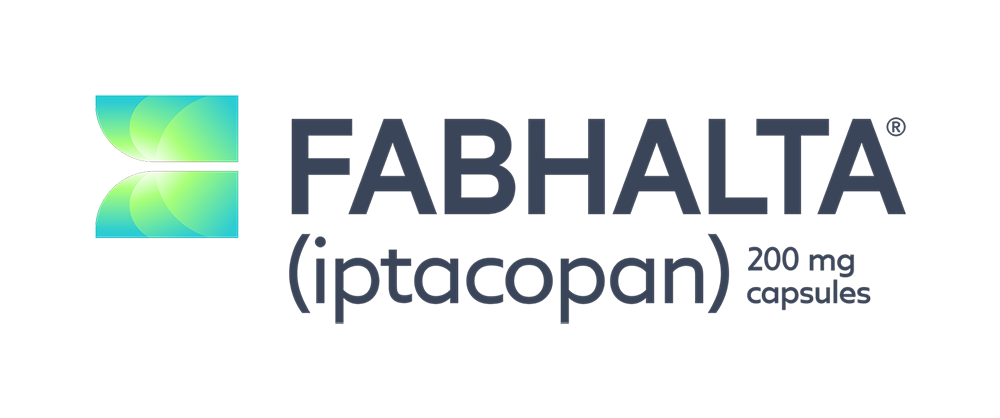Study design for FABHALTA® (iptacopan)
TO REDUCE PROTEINURIA IN ADULTS WITH PRIMARY IgAN AT RISK OF RAPID DISEASE PROGRESSION (GENERALLY A UPCR ≥1.5 g/g)1
APPLAUSE: A phase 3 clinical study assessing FABHALTA for patients with IgAN1,2
Study design: A multicenter, randomized, placebo-controlled, double-blind study1
Study population1,2:
Adults with biopsy-proven IgAN (median time from biopsy: 1 year)
Elevated proteinuria (UPCR ≥1 g/g)
eGFR ≥20 mL/min/1.73 m2
Patients were primarily treated with a stable dose of maximally tolerated RASi therapy with or without a stable dose of an SGLT2i
Rescue immunosuppressive treatment could be initiated per investigator discretion during the trial
BASELINE CHARACTERISTICS1,2of patients who contributed to the efficacy analysis (N=250) | ||
Gender: | MEST-C scorea: | Treatments: |
Mean age: | Mean eGFR: 64 | Comorbidities: |
Ethnicity: | Hematuriab: 75% | Geometric mean UPCR: 2.0 g/g |
aNot all MEST-C components were available for all patients.2
bHematuria was based on urine dipstick and not available for all patients.1
SELECTED KEY INCLUSION CRITERIA1,3:
Patients ≥18 years of age with biopsy-proven IgAN
Biopsy anytime for eGFR 20 to <30 mL/min/1.73 m²
Biopsy within 5 years for eGFR ≥45 mL/min/1.73 m²
Biopsy within 2 years (with <50% tubulointerstitial fibrosis) for eGFR 30 to <45 mL/min/1.73 m²
Proteinuria (UPCR ≥1 g/g) at screening and run-in period
Primarily on a stable dose of maximally tolerated RASi therapy with or without a stable dose of an SGLT2i
Vaccination against Neisseria meningitidis and Streptococcus pneumoniae. Recommendation to be vaccinated against Haemophilus influenzae type b
SELECTED KEY EXCLUSION CRITERIA3:
Any secondary IgAN
Previous treatment with immunosuppressive agents within 90 days before the first study drug administration
SBP >140 mm Hg or DBP >90 mm Hg at randomization
Bacterial, viral, or fungal infection within 14 days before randomization
Prior transplantation (any solid organ transplantation)
FABHALTA received accelerated approval in IgAN based on 24-hour UPCR reductions1-3
The interim efficacy analysis was based on the first 250 patients with eGFR ≥30 mL/min/1.73 m2 who had completed or discontinued the study prior to the Month 9 visit.1
Click on image to enlarge.
ACCELERATED APPROVAL1
FABHALTA was approved by the FDA based on UPCR data from the interim analysis at 9 months. It has not been established whether FABHALTA slows kidney function decline in patients with IgAN. Continued approval for this indication may be contingent upon verification and description of clinical benefit in a confirmatory clinical trial.
